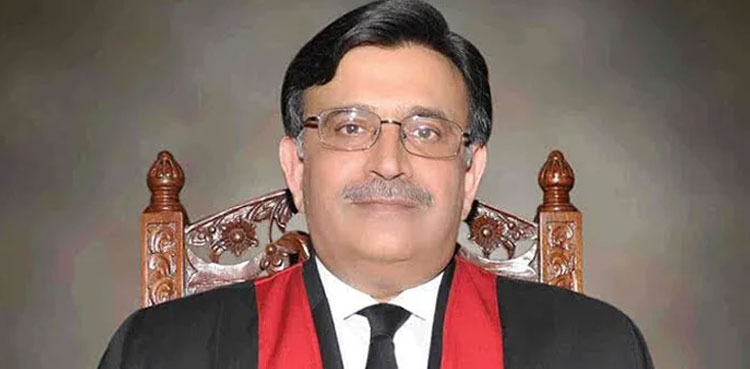
ISLAMABAD: The Supreme Court of Pakistan on Thursday resumed hearing into a suo-moto notice against the ruling of Deputy Speaker National Assembly Qasim Khan Suri over a no-trust move against the then Prime Minister Imran Khan, ARY NEWS reported.
The five member larger bench of the apex court hearing the suo moto comprises of Justice Ijazul Ahsan, Justice Mohammad Ali Mazhar, Justice Munib Akhtar and Justice Jamal Khan Mandokhel.
Barrister Ali Zafar’s arguments
The counsel for President, Barrister Ali Zafar, resumed his arguments before the court and over a question from the bench if the court is not the guardian of the Constitution, Zafar said that the constitution will only be safeguarded through constitutional means.
“Every article of the constitution should be kept in mind in order to guard it,” he said.
To this, the chief justice said that if voting would have been allowed over the no-trust motion, it would have brought clarity regarding who is the prime minister. To this Zafar asked if Parliament would be allowed to intervene if there is a dispute between the judges of the apex court.
“Since judiciary cannot intervene in the Parliamentary affairs in a similar way Parliament could not intervene in judicial affairs,” he argued.
During the arguments, Justice Jamal Khan Mandokhail said Parliament has the right to make laws and asked what would happen if Parliament fails to perform its duty. “The previous law will remain if there is no fresh lawmaking,” Ali Zafar replied.
During the hearing, the chief justice said that the president dissolves assembly on the advice of prime minister under article 58 however when a prime minister is facing a no-trust move, he could not recommend a dissolution.
The chief justice further remarked that there is no constitutional crisis in the country and apparently Article 95 of the Constitution is being violated. Justice Umar Ata Bandial said that the new election would cost billions.
PM’s counsel Imtiaz Siddiqui’s arguments
The counsel of the prime minister Advocate Imtiaz Siddiqui also argued before the apex court and said that courts have previously refrained from intervening into the Parliamentary affairs. “In Fazl Elahi case, the lawmakers were barred from voting and tortured but the court did not intervene,” he said while citing an example and termed Parliamentary affairs out of the domain of the court.
Read More: SUPREME COURT ADJOURNS NA SPEAKER’S RULING CASE TILL TOMORROW
The chief justice asked that those opposing the deputy speaker’s ruling are saying that leave grant could not be entertained after March 28. To this, the counsel said that the opposition did not challenge the deputy speaker over chairing the session and the latter did what he thought was right.
“The no-trust move was parliamentary process and no intervention could be made,” he said.
To this, the chief justice remarked that it is court that would decide on how much privilege is enjoyed by the Parliamentary proceedings.
To this, the counsel said that if speaker comes to know of a foreign conspiracy then he would act while using his prerogative to save the country. “If article 69 is read with article 127 it emerged that the parliamentary proceedings are being guarded and the court could not intervene into the matter,” he said and added that the deputy speaker cited decision from National Security Committee and no one could influence the body.
Naeem Bokhari presents minutes of NSC meeting
The counsel for speaker and deputy speaker Naeem Bokhari during his arguments spoke on point of order being taken in the assembly and said that the point of order could be taken at any time during the assembly proceedings.
“Will the court intervene if the speaker had rejected the point of order?” Bokhari asked and added, “Previously when assembly was dissolved the court despite objecting to it moved towards a fresh election.”
Speaker Asad Qaiser’s lawyer Naeem Bukhari on Thursday presented minutes of the recent of the Parliamentary Committee on National Security held on the “threat letter” and “foreign conspiracy” to Supreme Court (SC), ARY News reported.
Outgoing NA speaker Asad Qaiser’s lawyer Naeem Bukhari shared national security committee meeting on Lettergate with the apex court.
To which, the Chief Justice of Pakistan (CJP) Umar Ata Bandial asked the NA speaker’s lawyer about the details of the attendees of the meeting.
“Where are the attendees’ details of NSC meeting?” he asked Bukhari “Who briefed national security meeting?” the CJP further inquired.
At which, Naeem Bukhari told CJP that 29 invitations were issued for the meeting and national security advisor briefed the participants of the meeting on Lettergate.
To this, the CJP Bandial asked did the foreign minister attended the meeting?
At this point, Bukhari informed the SC that Shah Mehmood Qureshi was on official China trip when NSC meeting was held.
Attorney General agrees to in-camera briefing on NSC meeting
Attorney general during his arguments said that the parliamentary proceedings are exempted from any court review and the case could be decided without going into details of who is loyal or not.
He also refused to share details of the NSC meeting in open court and said that briefing was given on sensitive matter during the meeting. “I am ready for an in-camera briefing,” he added.
The attorney general said that prime minister is the biggest stakeholder of the system and therefore powers to dissolve the assembly lies with him.
He further argued that the prime minister needs no reason for dissolution of the assembly while the president also has the power to dissolve assembly without knowing the circumstances behind it.
“If the president does not act on the recommendation for dissolution then the assembly stands dissolve on its own within 48 hours,” he said.
from ARY NEWS https://ift.tt/NM0POSr
